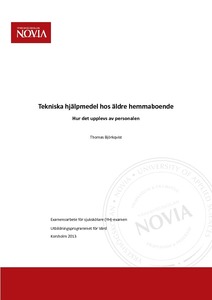Tekniska hjälpmedel hos äldre hemmaboende : hur det upplevs av personalen
Björkqvist, Thomas (2013)
Björkqvist, Thomas
Yrkeshögskolan Novia
2013

Creative Commons Attribution-NonCommercial-NoDerivs 3.0 Unported
Julkaisun pysyvä osoite on
https://urn.fi/URN:NBN:fi:amk-201302232546
https://urn.fi/URN:NBN:fi:amk-201302232546
Tiivistelmä
Syftet med studien är att kartlägga vilka tekniska hjälpmedel för äldre som används i kommunerna i svenska Österbotten samt att beskriva hur personal i ansvarsposition upplever att dessa stöder klienten. Studien är kvalitativ, semistrukturerade intervjuer har gjorts med tre informanter och intervjumaterialet har analyserats ur en fenomenologisk synvinkel.
Det framkom i studien att trygghet är en viktig aspekt av användandet av tekniska hjälpmedel för äldre hemmaboende. Det framkom också att personalen är nöjd med användandet av tekniska hjälpmedel. Två negativa aspekter vid användande av tekniska lösningar som visade sig i studien var att personalen kan uppleva problem med tekniken samt att användandet av denna typ av teknik kan vara problematisk vid demenssjukdomar.
Informanterna upplevde också att användningen av tekniska hjälpmedel kommer att öka men att det är en kostnadsfråga. Personalen som intervjuades var rädda att teknik som ännu inte användes kunde medföra etiska problem. Det framkom också ett paradoxalt tänkande hos de intervjuade, dels upplevdes att de tekniska lösningar som nu användes inte medförde några etiska problem, samtidigt upplevde de att de tekniska lösningarna som användes var etiskt problematiska. The aim of the study is to describe what assistive technology for older people are being used in the municipalities in Swedish Ostrobothnia and also to describe how personnel in a
position of responsibility experience the usefulness of these devices. The study is qualitative, semistructured interviews were carried out with three informants and the material gathered have been analyzed from a phenomenological point of view.
The study showed that safety is an important aspect of using assistive technology for older people living at home. The study also revealed that personnel is satisfied with the use of assistive technology. Two negative aspects of the use of assistive technology that was revealed in the study was that staff may experience problems with technology and that the
use of this technology may be problematic where the client suffers from dementia.
The informants experienced that the use of assistive technology will increase in the future but that it is a matter of cost. The informants were afraid that technology not yet being used could lead to ethical problems. The study also revealed a paradoxical thinking amongst the interviewed, on one hand they experienced that assistive technology that were being used did not bring any ethical problems, on the other hand the interviewed described that assistive technology that were being used did bring ethical problems.
Det framkom i studien att trygghet är en viktig aspekt av användandet av tekniska hjälpmedel för äldre hemmaboende. Det framkom också att personalen är nöjd med användandet av tekniska hjälpmedel. Två negativa aspekter vid användande av tekniska lösningar som visade sig i studien var att personalen kan uppleva problem med tekniken samt att användandet av denna typ av teknik kan vara problematisk vid demenssjukdomar.
Informanterna upplevde också att användningen av tekniska hjälpmedel kommer att öka men att det är en kostnadsfråga. Personalen som intervjuades var rädda att teknik som ännu inte användes kunde medföra etiska problem. Det framkom också ett paradoxalt tänkande hos de intervjuade, dels upplevdes att de tekniska lösningar som nu användes inte medförde några etiska problem, samtidigt upplevde de att de tekniska lösningarna som användes var etiskt problematiska.
position of responsibility experience the usefulness of these devices. The study is qualitative, semistructured interviews were carried out with three informants and the material gathered have been analyzed from a phenomenological point of view.
The study showed that safety is an important aspect of using assistive technology for older people living at home. The study also revealed that personnel is satisfied with the use of assistive technology. Two negative aspects of the use of assistive technology that was revealed in the study was that staff may experience problems with technology and that the
use of this technology may be problematic where the client suffers from dementia.
The informants experienced that the use of assistive technology will increase in the future but that it is a matter of cost. The informants were afraid that technology not yet being used could lead to ethical problems. The study also revealed a paradoxical thinking amongst the interviewed, on one hand they experienced that assistive technology that were being used did not bring any ethical problems, on the other hand the interviewed described that assistive technology that were being used did bring ethical problems.
